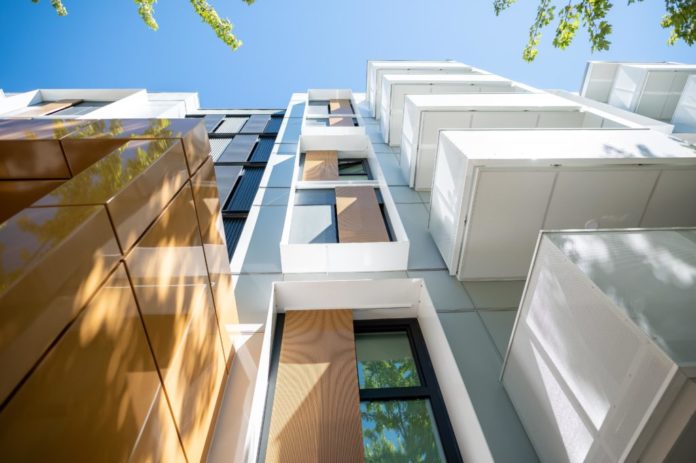Passivhaus buildings are not new to Canadian urban development; however, large Passivhaus buildings are generally unheard of in Canada.
A Passivhaus (or Passive House in English) is an energy-efficient building that fulfills the international scientific Passive House standard requirements. In a nutshell, Passive House requirements are based on a building producing 90% less energy than a typical building of the same size.
Evolve is one of the first multi-unit residential buildings targeting Passive House certification in Canada. The building is located on the south end of the University of British Columbia’s campus and is six stories high with 110 units inside.
Evolve has many unique design elements and renewable energy systems within it, which makes it stand out from other Canadian multi-unit residential buildings. For example, exterior movable shades which block strong sun rays from heating the units during the hot months, “tilt and turn” windows that increase natural ventilation rates over typical buildings, and thermal insulation that reduces the amount of heat lost through the building.
All of these elements make the building energy-ready by decreasing the amount of energy production required for heating or cooling, which in turn nearly negates the energy bill.
Evolve today
Now that occupants have begun moving into Evolve, a side-by-side comparison between Evolve and a typical residential building across the street will be carried out. This research project will be led by Dr. Adam Rysanek, Assistant Professor of Environmental Systems at UBC School of Architecture and Landscape Architecture, along with his research team.
The four-year research campaign has two main research goals: to evaluate the performance of the Evolve building based on the Passive House standard requirements, and to evaluate the Evolve occupants’ health and well-being after living in the building, based on responses to a post-occupancy evaluation survey.
This research project may be the first of its kind on Earth because the research team will have the ability to compare two buildings that were built around the same time, are the same size, and will be exposed to the same climate, as they are literally across the street from one another. This comparison analysis will provide excellent insight into how Evolve is performing in terms of meeting Passive House standards as well as taking into account the occupants’ quality of life compared to a typical building.
The future of Evolve
By 2030, the city of Vancouver plans to have most new buildings use 100% renewable energy and have no operational greenhouse gas emissions. Therefore, Dr. Rysanek pointed out that new residential buildings in Vancouver will have to be very close to Evolve in terms of design and performance.
If Evolve meets Passive House standards, and improves or maintains occupants’ health and well-being outcomes then “we validate the [Passive House] policies that are already in place and [Evolve will provide] better fuel for other jurisdictions in Canada to do the same,” Dr. Rysanek stated.
Altogether, if the research project findings are in favour of the Evolve building, Evolve could be used as a model for new residential builds trying to meet Passive House standards in Vancouver, elsewhere in Canada, and even internationally.
On the other hand, if findings from the project are in favour of the typical building, then Dr. Rysanek is still optimistic, stating that these findings will lead to a change in how architects think about design for buildings targeting Passive House standards as well as it will lead to “recommendation[s] that we can kind of entrench [in Vancouver]” and elsewhere when designing and developing Passive House buildings.
Therefore, no matter the outcome of the project, there will be a positive chain reaction to Dr. Rysanek and team’s research findings.










































